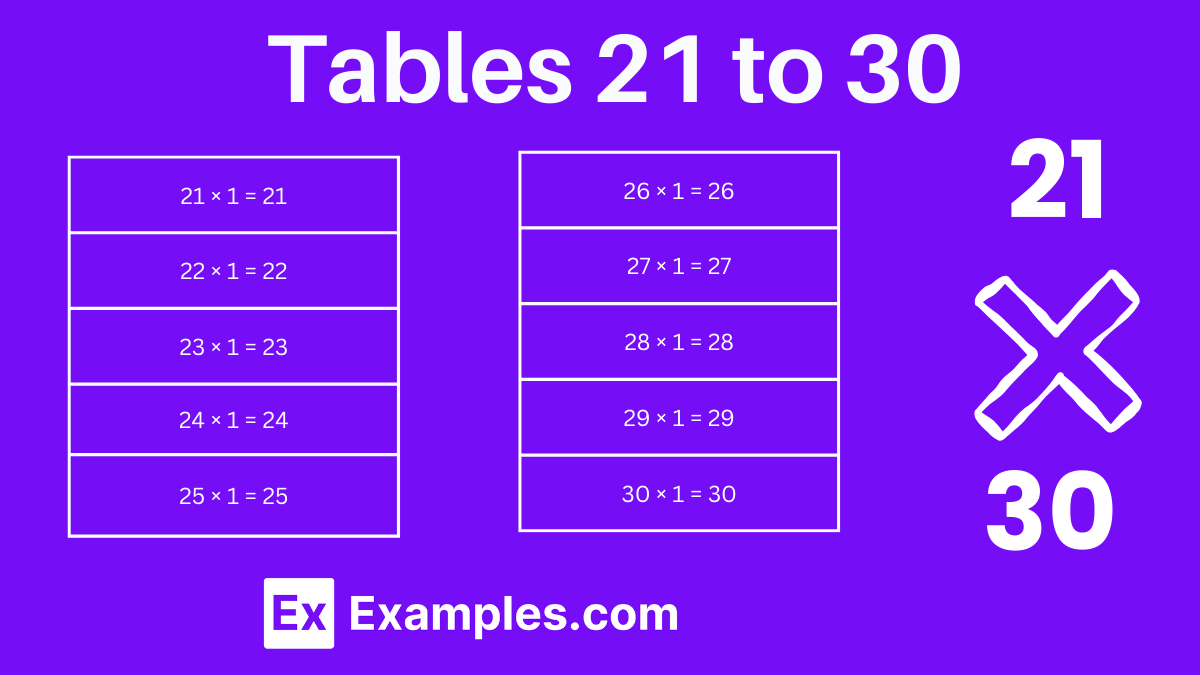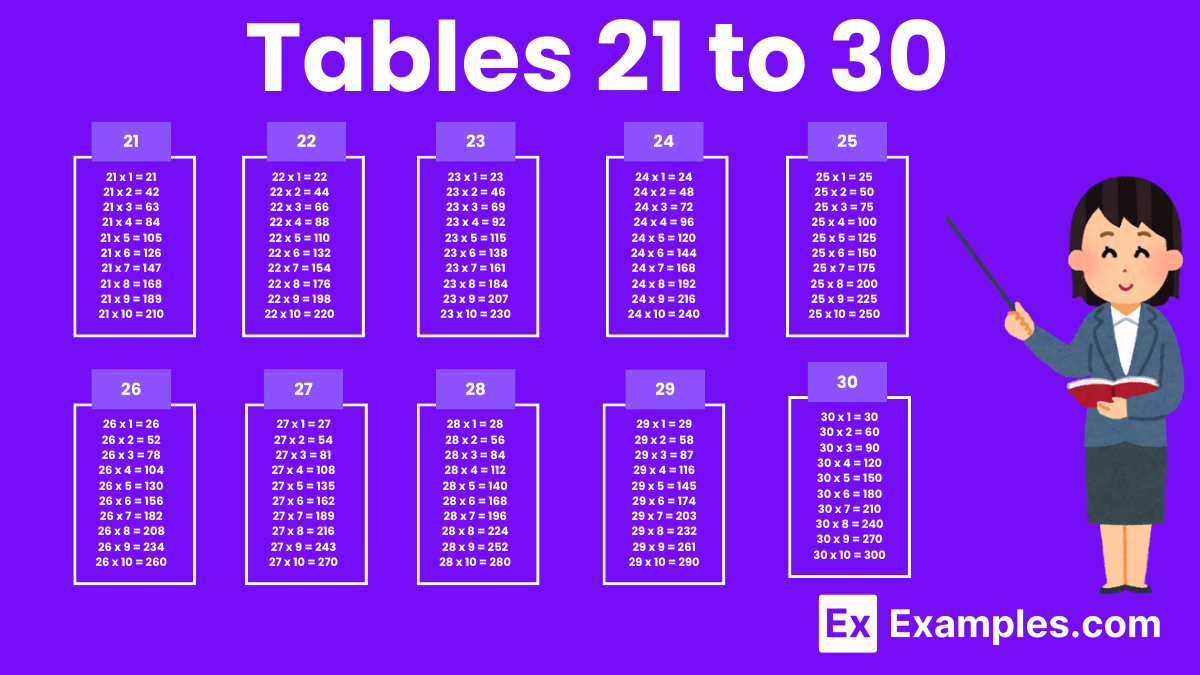What is 21 multiplied by 4?
82
84
86
88


The multiplication chart for tables 21 to 30 is designed to help students efficiently learn and recall higher multiplication facts. This chart is crucial for advancing mathematical skills and enhancing understanding of complex numerical relationships.

Download Tables From 21 to 30 Chart Pdf
The multiplication chart for tables 21 to 30 is a valuable educational tool, essential for students needing to master the higher ranges of multiplication. This detailed chart visually represents each multiplication fact within this range, organized in a clear and systematic grid. It is perfect for enhancing computational skills, providing a reliable reference for quick verification and learning, thus supporting more advanced mathematical studies and applications.
Download Tables From 21 to 30 Chart Pdf
| 21 Table | 22 Table | 23 Table | 24 Table | 25 Table |
|---|---|---|---|---|
| 21 x 1 = 21 | 22 x 1 = 22 | 23 x 1 = 23 | 24 x 1 = 24 | 25 x 1 = 25 |
| 21 x 2 = 42 | 22 x 2 = 44 | 23 x 2 = 46 | 24 x 2 = 48 | 25 x 2 = 50 |
| 21 x 3 = 63 | 22 x 3 = 66 | 23 x 3 = 69 | 24 x 3 = 72 | 25 x 3 = 75 |
| 21 x 4 = 84 | 22 x 4 = 88 | 23 x 4 = 92 | 24 x 4 = 96 | 25 x 4 = 100 |
| 21 x 5 = 105 | 22 x 5 = 110 | 23 x 5 = 115 | 24 x 5 = 120 | 25 x 5 = 125 |
| 21 x 6 = 126 | 22 x 6 = 132 | 23 x 6 = 138 | 24 x 6 = 144 | 25 x 6 = 150 |
| 21 x 7 = 147 | 22 x 7 = 154 | 23 x 7 = 161 | 24 x 7 = 168 | 25 x 7 = 175 |
| 21 x 8 = 168 | 22 x 8 = 176 | 23 x 8 = 184 | 24 x 8 = 192 | 25 x 8 = 200 |
| 21 x 9 = 189 | 22 x 9 = 198 | 23 x 9 = 207 | 24 x 9 = 216 | 25 x 9 = 225 |
| 21 x 10 = 210 | 22 x 10 = 220 | 23 x 10 = 230 | 24 x 10 = 240 | 25 x 10 = 250 |
| 26 Table | 27 Table | 28 Table | 29 Table | 30 Table |
|---|---|---|---|---|
| 26 x 1 = 26 | 27 x 1 = 27 | 28 x 1 = 28 | 29 x 1 = 29 | 30 x 1 = 30 |
| 26 x 2 = 52 | 27 x 2 = 54 | 28 x 2 = 56 | 29 x 2 = 58 | 30 x 2 = 60 |
| 26 x 3 = 78 | 27 x 3 = 81 | 28 x 3 = 84 | 29 x 3 = 87 | 30 x 3 = 90 |
| 26 x 4 = 104 | 27 x 4 = 108 | 28 x 4 = 112 | 29 x 4 = 116 | 30 x 4 = 120 |
| 26 x 5 = 130 | 27 x 5 = 135 | 28 x 5 = 140 | 29 x 5 = 145 | 30 x 5 = 150 |
| 26 x 6 = 156 | 27 x 6 = 162 | 28 x 6 = 168 | 29 x 6 = 174 | 30 x 6 = 180 |
| 26 x 7 = 182 | 27 x 7 = 189 | 28 x 7 = 196 | 29 x 7 = 203 | 30 x 7 = 210 |
| 26 x 8 = 208 | 27 x 8 = 216 | 28 x 8 = 224 | 29 x 8 = 232 | 30 x 8 = 240 |
| 26 x 9 = 234 | 27 x 9 = 243 | 28 x 9 = 252 | 29 x 9 = 261 | 30 x 9 = 270 |
| 26 x 10 = 260 | 27 x 10 = 270 | 28 x 10 = 280 | 29 x 10 = 290 | 30 x 10 = 300 |
Problem: 21 x 3 = ?
Solution: 21 x 3 = 63 (Multiplying 21 by 3 yields 63.)
Problem: 22 x 4 = ?
Solution: 22 x 4 = 88 (Twenty-two times four equals eighty-eight.)
Problem: 23 x 5 = ?
Solution: 23 x 5 = 115 (Twenty-three multiplied by five results in one hundred fifteen.)
Problem: 24 x 6 = ?
Solution: 24 x 6 = 144 (Twenty-four times six equals one hundred forty-four.)
Problem: 25 x 7 = ?
Solution: 25 x 7 = 175 (Twenty-five times seven equals one hundred seventy-five.)
Problem: 26 x 8 = ?
Solution: 26 x 8 = 208 (Twenty-six multiplied by eight results in two hundred eight.)
Problem: 27 x 9 = ?
Solution: 27 x 9 = 243 (Twenty-seven times nine yields two hundred forty-three.)
Problem: 28 x 5 = ?
Solution: 28 x 5 = 140 (Twenty-eight times five equals one hundred forty.)
Problem: 29 x 3 = ?
Solution: 29 x 3 = 87 (Twenty-nine multiplied by three results in eighty-seven.)
Problem: 30 x 10 = ?
Solution: 30 x 10 = 300 (Thirty times ten equals three hundred.)
You can memorize tables 21 to 30 more easily by breaking them down into smaller chunks, using mnemonic devices or memory aids, practicing regularly, and focusing on understanding the patterns within each table.
Some tips for teaching multiplication tables 21 to 30 to children include making learning fun and engaging by using games, songs, or visual aids, providing plenty of opportunities for practice, and offering positive reinforcement and encouragement.
Multiplication tables 21 to 30 can be used in everyday life for various purposes, such as calculating prices when shopping, determining quantities when cooking or baking, and managing time when planning schedules or activities.
Some common mistakes people make when learning tables 21 to 30 include trying to memorize all the facts at once without breaking them down into smaller chunks, focusing solely on rote memorization without understanding the underlying concepts, and neglecting regular practice.
Yes, there are many online resources and tools available to help with learning tables 21 to 30, including educational websites, apps, games, and printable worksheets. These resources can provide interactive and engaging ways to practice multiplication skills.
Text prompt
Add Tone
10 Examples of Public speaking
20 Examples of Gas lighting
What is 21 multiplied by 4?
82
84
86
88
What is the product of 22 and 5?
100
105
110
115
If you have 6 groups of 23 items each, how many items do you have in total?
130
138
144
150
Find the value of 24 multiplied by 7.
156
162
168
174
What is the result of multiplying 25 by 9?
210
215
220
225
Calculate 26 times 8.
198
204
208
214
How many items are there in 9 groups of 28?
242
252
262
272
What is 30 multiplied by 5?
140
145
150
155
If you multiply 21 by 11, what is the result?
220
230
231
240
Calculate 23 times 15.
340
345
350
355
Before you leave, take our quick quiz to enhance your learning!

